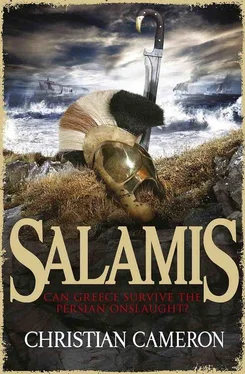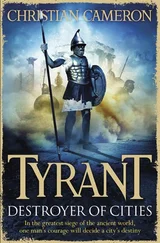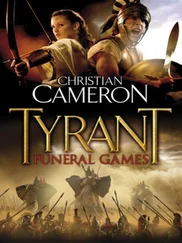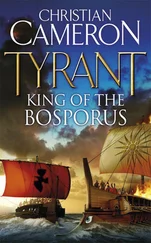Christian Cameron - Salamis
Здесь есть возможность читать онлайн «Christian Cameron - Salamis» весь текст электронной книги совершенно бесплатно (целиком полную версию без сокращений). В некоторых случаях можно слушать аудио, скачать через торрент в формате fb2 и присутствует краткое содержание. Год выпуска: 2015, Издательство: ORION, Жанр: Исторические приключения, на английском языке. Описание произведения, (предисловие) а так же отзывы посетителей доступны на портале библиотеки ЛибКат.
- Название:Salamis
- Автор:
- Издательство:ORION
- Жанр:
- Год:2015
- ISBN:нет данных
- Рейтинг книги:4 / 5. Голосов: 1
-
Избранное:Добавить в избранное
- Отзывы:
-
Ваша оценка:
- 80
- 1
- 2
- 3
- 4
- 5
Salamis: краткое содержание, описание и аннотация
Предлагаем к чтению аннотацию, описание, краткое содержание или предисловие (зависит от того, что написал сам автор книги «Salamis»). Если вы не нашли необходимую информацию о книге — напишите в комментариях, мы постараемся отыскать её.
Salamis — читать онлайн бесплатно полную книгу (весь текст) целиком
Ниже представлен текст книги, разбитый по страницам. Система сохранения места последней прочитанной страницы, позволяет с удобством читать онлайн бесплатно книгу «Salamis», без необходимости каждый раз заново искать на чём Вы остановились. Поставьте закладку, и сможете в любой момент перейти на страницу, на которой закончили чтение.
Интервал:
Закладка:
Christian Cameron
Salamis
Prologue
Here we are again — the penultimate night of my feast. Quite a crowd for an old man’s ravings.
But this is the best of tales since Troy — with sorrow and joy, men and women, heroes and traitors and men, like Themistocles, who were both. May you never see such times, thugater.
The first night, I told you of my youth and how I went to Calchus the priest to be educated as a gentleman, and instead learned to be a spear fighter. Because Calchus was no empty windbag, but a Killer of Men, who had stood his place many times in the storm of bronze. And veterans came from all over Greece to hang their shields for a time at our shrine and talk to Calchus, and he sent them away whole, or better men, at least. Except that the worst of them, the Hero called for, and the priest would kill them on the precinct walls and send their shades shrieking to feed the old Hero, or serve him in Hades.
Mind you, friends, Leithos wasn’t some angry old god demanding blood sacrifice, but Plataea’s hero from the Trojan War. And he was a particularly Boeotian hero, because he was no great man-slayer, no tent-sulker. His claim to fame is that he went to Troy and fought all ten years. That on the day that mighty Hector raged by the ships of the Greeks and Achilles sulked in his tent, Leithos rallied the lesser men and formed a tight shield wall and held Hector long enough for Ajax and the other Greek heroes to rally.
You might hear a different story in Thebes, or Athens, or Sparta. But that’s the story of the Hero I grew to serve, and I spent years at his shrine, learning the war dances that we call the Pyrrhiche. Oh, I learned to read old Theognis and Hesiod and Homer, too. But it was the spear, the sword and the aspis that sang to me.
When my father found that I was learning to be a warrior and not a man of letters, he came and fetched me home, and old Calchus — died. Killed himself, more like. But I’ve told all this — and how little Plataea, our farm town at the edge of Boeotia, sought to be free of cursed Thebes and made an alliance with distant Athens. I told you all how godlike Miltiades came to our town and treated my father, the bronze-smith and Draco the wheelwright and old Epictetus the farmer like Athenian gentlemen — how he wooed them with fine words and paid hard silver for their products, so that he bound them to his own political ends and to the needs of Athens.
When I was still a gangly boy — tall, and well-muscled, as I remember, but too young to fight in the phalanx — Athens called for little Plataea’s aid, and we marched over Cithaeron, the ancient mountain that is also our glowering god, and we rallied to the Athenians at Oinoe. We stood beside them against Sparta and Corinth and all the Peloponnesian cities — and we beat them.
Well, Athens beat them. Plataea barely survived, and my older brother, who should have been my father’s heir, died there with a Spartiate’s spear in his belly.
Four days later, when we fought again — this time against Thebes — I was in the phalanx. Again, we triumphed. And I was a hoplite.
And two days later, when we faced the Euboeans, I saw my cousin Simon kill my father, stabbing him in the back under his bright bronze cuirass. When I fell over my father’s corpse, I took a mighty blow and when I awoke, I had no memory of Simon’s treachery.
When I awoke, of course, I was a slave. Simon had sold me to Phoenician traders, and I went east with a cargo of Greek slaves.
I was a slave for some years, and in truth, it was not a bad life. I went to a fine house, ruled by rich, elegant, excellent people: Hipponax the poet and his wife and two children. Archilogos, the eldest and a boy, was my real master, and yet my friend and ally, and we had many escapades together. And his sister, Briseis-
Ah, Briseis. Helen, returned to life.
We lived in far-off Ephesus, one of the most beautiful and powerful cities in the Greek world, yet located on the coast of Asia. Greeks have lived there since the Trojan war, and the temple of Artemis there is one of the wonders of the world. My master went to school each day at the temple of Artemis, and there the great philosopher, Heraclitus, had his school, and he would shower us with questions every bit as painful as the blows of the old fighter who taught us pankration at the gymnasium.
Heraclitus. I have met men, and women, who saw him as a charlatan, a dreamer, a mouther of impieties. In fact, he was deeply religious — his family held the heredity priesthood of Artemis — but he believed that fire was the only true element, and change the only constant. I can witness to both.
It was a fine life. I got a rich lord’s education for nothing. I learned to drive a chariot, and to ride a horse and to fight and to use my mind like a sword. I loved it all, but best of all …
Best of all, I loved Briseis.
And while I loved her — and half a dozen other young women — I grew to manhood listening to Greeks and Persians plotting various plots in my master’s house, and one night all the plots burst forth into ugly blossoms and bore the fruit of red-handed war, and the Greek cities of Ionia revolted against the Persian overlords.
Now, as tonight’s story will be about war with the Persians, let me take a moment to remind you of the roots of the conflict, because they are ignoble, and the Greeks were no better than the Persians, and perhaps a great deal worse. The Ionians had money, power, and freedom: freedom to worship, freedom to rule themselves under the Great King, and all it cost them was taxes and the ‘slavery’ of having to obey the Great King in matters of foreign policy. The ‘yoke’ of the Persians was light and easy to wear, and no man alive knows that better than me, because I served, slave though I was, as a herald between my master and the mighty Artaphernes, the satrap of all Phrygia. I knew him well; I ran his errands, dressed him at times, and one dark night, when my master Hipponax caught the Persian in his wife’s bed, I saved his life when my master would have killed him. I saved my master’s life, as well, holding the corridor against four Persian soldiers of high repute — Aryanam, Pharnakes, Cyrus and Darius. I know their names because they were my friends, in other times.
And you’ll hear of them again. Except Pharnakes, who died in the Bosporus, fighting Carians.
At any rate, after that night of swords and fire and hate, my master went from being a loyal servant of Persia to a hate-filled Greek ‘patriot’. And our city, Ephesus, roused itself to war. And amidst it all, my beloved Briseis lost her fiancé to rumour and innuendo, and Archilogos and I beat him for his impudence. I had learned to kill, and to use violence to get what I wanted. And as a reward, I got Briseis — or to be more accurate, she had me. My master freed me, not knowing that I had just deflowered his daughter, and I sailed away with Archilogos to avoid the wrath of the suitor’s relatives.
We joined the Greek revolt at Lesvos, and there, on the beach, I met Aristides — sometimes called the Just, one of the greatest heroes of Athens, and Miltiades’ political foe.
That was the beginning of my true life. My life as a man of war. I won my first games on a beach in Chios and I earned my first suit of armour, and I went to war against the Persians.
But the God of War, Ares, was not so much in charge of my life as Aphrodite, and when we returned to Ephesus to plan the great war, I spent every hour that I could with Briseis, and the result, I think now, was never in doubt. But Heraclitus, the great sage, asked me to swear an oath to all the gods that I would protect Archilogos and his family, and I swore. Like the heroes in the old stories, I never thought about the consequence of swearing such a great oath and sleeping all the while with Briseis.
Читать дальшеИнтервал:
Закладка:
Похожие книги на «Salamis»
Представляем Вашему вниманию похожие книги на «Salamis» списком для выбора. Мы отобрали схожую по названию и смыслу литературу в надежде предоставить читателям больше вариантов отыскать новые, интересные, ещё непрочитанные произведения.
Обсуждение, отзывы о книге «Salamis» и просто собственные мнения читателей. Оставьте ваши комментарии, напишите, что Вы думаете о произведении, его смысле или главных героях. Укажите что конкретно понравилось, а что нет, и почему Вы так считаете.












